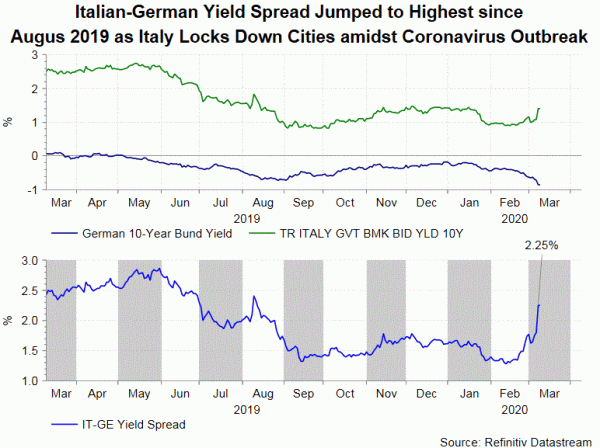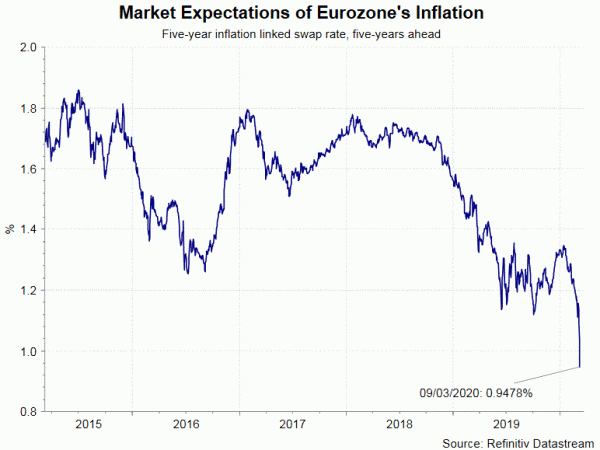Coronavirus originated from Wuhan, China has become an pandemic affecting about 90 countries and territories in the world. In the Eurozone, the top 3 economies have reported totally 11,800 cases so far, with Italy alone taking up over 9,000 cases. The rapid transmission of the virus is expected hurt the region’s economy hard. We expect ECB to announce a stimulus package at this weeks’ meeting, including deposit rate cut, by -10 bps, to -0.6%, adjustment of TLTRO to incentivize banks to take credit and increase the size of the QE program to 40B euro/month, from 30B/month previously. It is likely the members will signal to amend the tiering system to include multiple tiers after further rate cut.
We doubt the effectiveness of further monetary easing measures. ECB’s policy rate has been staying in the negative territory for years. It has offered limited help to the economy so far. Rather, it has hurt banking profitability which led to the introduction of the two-tier system. Meanwhile, ECB has kicked off strategic review in January, in hope of finding new approaches to stimulate growth.
Yet, we believe that ECB is obliged to act this month. The Fed implemented an emergency rate cut by -50 bps last week. The market has continued to price in further rate cut at the upcoming meeting on March 18. Both RBA and BOC also lowered interest rates last week. The market has been anticipating ECB to cut rates, accompanying other unconventional measures, amidst the worsening situation of the epidemic in Europe.
Before the coronavirus outbreak has become widespread in Europe, policymakers have already acknowledged the need to reform its inflation targeting strategy. ECB sets its monetary policy with the objective to returning inflation to “below, but close to, 2%”. The asymmetry of the inflation target has the consequence of leaving inflation to stay far below 2% as investors perceive that the central bank would remove stimulus if it moves close that level. Meanwhile, the market will overact to hawkish comments by policymakers. Indeed, statistics shows that headline HICP in the Eurozone has been staying below 2% for over 70% of the time since the global financial crisis in 2007/08. Meanwhile, the recent dive in inflation expectations has raised concerns of inflation de-anchoring. As ECB seeks to shift to symmetric inflation targeting, the options it might consider include point target (FOMC), targeting range (e.g. RBNZ) or average inflation targeting (average 2% over time).
ECB will release updated economic projections this week. We expect growth and inflation forecasts will be revised lower. However, economic data reflecting impacts of coronavirus outbreak has not been released. We believe policymakers will deliver a dovish message and warn of the impacts of coronavirus outbreak on European economy. Moreover, ECB would call for governments to implement fiscal stimulus in light of limited monetary policy tools.


